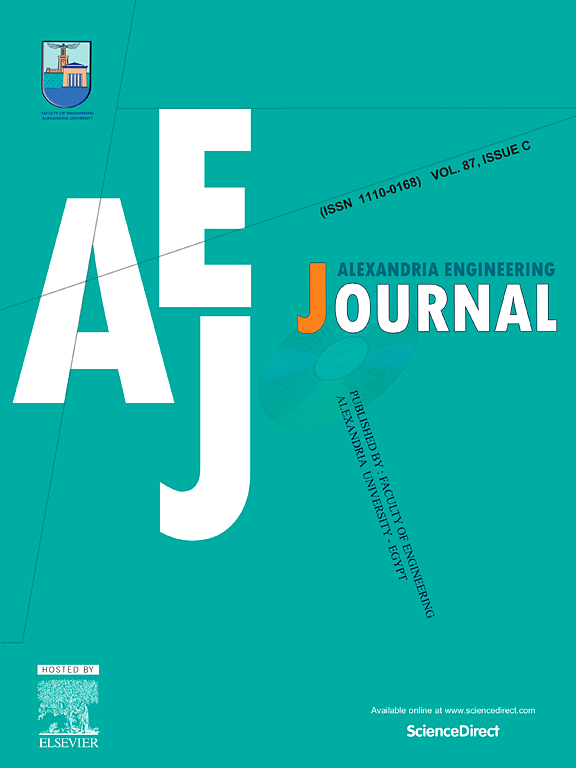Energy-efficient unequal multi-level clustering for underwater wireless sensor networks
IF 6.2
2区 工程技术
Q1 ENGINEERING, MULTIDISCIPLINARY
引用次数: 0
Abstract
Underwater Wireless Sensor Networks (UWSNs) have emerged as a critical piece of technology for a wide range of maritime applications, including environmental monitoring, resource exploration, and catastrophe avoidance. An Energy Efficient Unequal Multilevel Clustering (EEUMC) algorithm tailored to UWSNs is proposed in this study. The EEUMC's primary purpose is to enhance the efficiency of data movement inside the network while decreasing the amount of energy lost. The proposed method employs a multilevel clustering framework, which divides the network into hierarchical groups based on node attributes and residual energy content. EEUMC introduces an unequal clustering technique, which differs from traditional clustering approaches. Cluster heads (CHs) are dynamically selected in this technique based on their energy levels as well as their proximity to sink nodes. The EEUMC integrates sophisticated routing protocols and adaptive data aggregation techniques in order to boost the energy economy even further. The routing algorithms route data flows across energy-efficient channels automatically, and adaptive data aggregation reduces redundant transmissions to conserve energy and keep the system functioning smoothly. This particular configuration of unequal clustering, intelligent routing, and adaptive aggregation all work together to improve data-collecting efficiency and network’s lifespan. The efficiency of the proposed EEUMC scheme was thoroughly tested through a number of simulations and head-to-head comparisons with alternative clustering approaches. When compared to more traditional approaches, the findings reveal that EEUMC greatly increases network longevity and data transmission rates. Furthermore, the scheme is robust in the sense that it can withstand changing network conditions while still ensuring a balanced consumption of energy across all nodes.
水下无线传感器网络的高能效不平等多级聚类
水下无线传感器网络(UWSN)已成为环境监测、资源勘探和灾难规避等广泛海上应用的关键技术。本研究提出了一种专为 UWSNs 量身定制的高能效不等多级聚类(EEUMC)算法。EEUMC 的主要目的是提高网络内数据移动的效率,同时减少能量损耗。所提出的方法采用了多级聚类框架,根据节点属性和剩余能量含量将网络划分为不同等级的群组。EEUMC 引入了一种不同于传统聚类方法的不平等聚类技术。在这种技术中,簇头(CH)是根据节点的能量水平及其与汇节点的距离动态选择的。EEUMC 集成了先进的路由协议和自适应数据聚合技术,以进一步提高能源经济性。路由算法通过节能通道自动路由数据流,自适应数据聚合减少冗余传输,以节约能源并保持系统平稳运行。这种不平等聚类、智能路由和自适应聚合的特殊配置共同提高了数据收集效率和网络寿命。通过大量模拟以及与其他聚类方法的正面比较,对所提出的 EEUMC 方案的效率进行了全面测试。研究结果表明,与传统方法相比,EEUMC 可大大提高网络寿命和数据传输速率。此外,该方案还具有很强的鲁棒性,既能承受不断变化的网络条件,又能确保所有节点的能量消耗平衡。
本文章由计算机程序翻译,如有差异,请以英文原文为准。
求助全文
约1分钟内获得全文
求助全文
来源期刊

alexandria engineering journal
Engineering-General Engineering
CiteScore
11.20
自引率
4.40%
发文量
1015
审稿时长
43 days
期刊介绍:
Alexandria Engineering Journal is an international journal devoted to publishing high quality papers in the field of engineering and applied science. Alexandria Engineering Journal is cited in the Engineering Information Services (EIS) and the Chemical Abstracts (CA). The papers published in Alexandria Engineering Journal are grouped into five sections, according to the following classification:
• Mechanical, Production, Marine and Textile Engineering
• Electrical Engineering, Computer Science and Nuclear Engineering
• Civil and Architecture Engineering
• Chemical Engineering and Applied Sciences
• Environmental Engineering
 求助内容:
求助内容: 应助结果提醒方式:
应助结果提醒方式:


